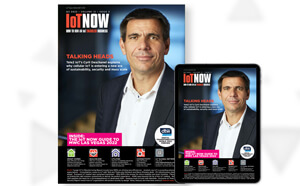Dan McDuffie’s career spans more than 20 years in the telecom, internet and wireless industries. Wyless’ CEO began by working in the long distance communications industry with Comtel Group and served as senior vice president of
Interoute, the pan-European fibre network operator. In 2006 he was Wyless’ first North American employee, becoming Group CEO in 2011. In his spare time he is a stand-in drummer for several over-the-hill ’80s cover bands (his words, not ours), and says he likes to think he can surf. Here, Jeremy Cowan, the editor of M2M Now, asks him to explain Wyless’ belief that M2M is shifting to a new “battleground”.
M2M Now: Dan, the obvious question is; Why do you feel that the M2M battleground needs changing in 2013 and what is Wyless doing about it?
Dan McDuffie: You know, Jeremy, the other day I took a look back at the interview that we did way back in September of 2011, my famous ‘SIM Card / Deck of Cards’ Cover shot and then at Steve Priestley’s interview last year, and in both pieces we spoke a lot about the evolution of the M2M business, about becoming more end-to-end, morphing from MVNO to MSP, et cetera. During 2012 we put a lot of the building blocks of our evolving business model into place.
In my mind it’s all about leveraging our assets and at the same time building more and more services along the horizontal value stack. We have a managed network, a software platform, a support infrastructure and an ecosystem of partners. Most important is that we have experience… nearly 10 years of experience in working with partners who are deploying M2M projects of all kinds, of every scale, all around the world. All of these assets and experiences can be leveraged into a modular range of services that are designed to address the needs of our partners and to deliver olutions to our customers.
Today most of our peer group continue to push managed connectivity, and layer it with support. Many are really good at it, some maybe not so good, but we won’t name names! Tomorrow is all about solutions. So, that’s what we’re doing to change the battleground, we are delivering solutions to the market, and this year we are bringing them all together into a coherent set of products.
We are calling these end-to-end solutions Wyless Gears. It’s a modular set of products and services that starts at infrastructure and basic connectivity and moves across the entire value chain to hardware, engineering, software, support, billing, branding and even the physical installation of end devices. Our goal is to listen to what our customers and partners need and then provide it. If we can’t provide it, we guarantee that we have a partner who can, and we
will make that solution available as a true partner.
It’s an extension of the same basic multi-carrier philosophy that has been the cornerstone of our business for the past 10 years… we have moved from National operators to Global operators to what I call a Multi-Domestic strategy. It means that, no matter where you go, you need access to a blend of carriers in order to effectively deploy a global project with
more scope and less risk. The same actually applies to many other aspects of the M2M Value chain… an open and agnostic service layer. It’s critical.
So, we believe that this is the only way forward in an increasingly complex and ever-evolving market. Customers are demanding a full end-to-end solutions partner and we intend on delivering that promise to the market. If I’m right, and that’s the new battleground, then my goal is to be the first guy on it. In fact, we’re already swarming the castle, I can assure you!
M2M Now: So what is the full range of services that a Managed Services Provider needs to offer their customers and partners?
Dan: We have grown our products to include Engineering, Professional Services, which includes Project Management, Hardware and Embedded Software Engineering, Software Design and Value Added Services where we have a whole new range of services including handling billing and customer support on behalf of our customers. We have added network design and configuration as well as many elements of the supply chain, including hardware selection through arehousing and installation services. Then, on top of that, we continue to expand the feature set of our Porthos platform, offering not just a service delivery, but an entire ‘MSP in a box’.
As we move into 2013 you will hear more and more from Wyless about our Gears strategy, putting more emphasis on the key elements that are required to provide a complete global end-to-end solution with a true modular and consultative approach to our partner’s requirements. We are moving from a transactional to a project-oriented business model.
M2M Now: Picking up on some of the points that you have mentioned, the multi-carrier strategy comes through very clearly as one of the key plays in ‘changing the M2M battleground’, do you see a limit to the number of MNOs that you can partner with successfully?
Dan: That’s a tricky question because realistically the answer is, that you can’t have a strategic relationship with everyone. But, that said, if we don’t have a connection to a particular operator, we are doing ourselves, our customers and that operator a disservice. That’s three parties losing out.
I mean, you have to draw the line somewhere, we’re not going to necessarily need two mobile operators in Latvia (sorry in advance to the operators in Latvia!), but at the same time we have this philosophy that if a customer really needs a connection to a mobile operator somewhere then we’re just going to do it, it just becomes a time vs. money ROI discussion between ourselves, our customer and the operator and we really truly look at it that way.
I don’t think anybody else is crazy enough to say they will connect to any cellular carrier, anywhere, given the right set of circumstances, but we’ve backed it up with results, so please don’t challenge me; my Project Managers will hate you for it!
So, during 2012 we connected to many more carriers, ending the year with over 15 separate MNO connections, and in some cases up to five or six managed connections into each of them. At any given time we are working on three to four more connections, sometimes new managed APNs or MPNs into operators we already have infrastructure with, for
a new project, and sometimes to entirely new MNOs. I have no doubt that we’ll be connected to 20 separate cellular operators by the end of this year.
That to me is part of the new battleground as well because, let’s be frank, the more places we are with our multi-domestic strategy, the more projects we will get involved with. And when you go beyond just selling and fighting in the connectivity layer to delivering real solutions, then the more projects you have and the higher value you are creating, not just for your company, but for your customers and your partners along the value chain and this includes the MNOs. They’ve all invested billions in their infrastructure and we owe them a lot for building the superhighways that all of our innovative solutions travel over. I want to give them my business and at the same time, provide solutions for them to drive more business on their networks.
M2M Now: Do you see any particular vertical markets and solutions that will get more focus in 2013 and beyond?
Dan: That’s a difficult question Jeremy, because all of the verticals are just booming, we’re literally seeing it come from everywhere. Of particular focus and interest to Wyless are ‘green projects,’ driver behaviour, and telemedicine. But we’re seeing new innovations in security and also working on lots of new high bandwidth applications including into the
enterprise mobility space, which blurs the lines between M2M and traditional mobile services. We’ve talked about many of these in the past, of course. In the eHealth vertical we have a perfect storm finally coming together… an ageing population and continuing cost pressure on in-hospital care, so that remote homecare, self-diagnosing kiosks in pharmacies, and healthcare apps will become the norm. I think Sam Lucero of IHS (www.imsresearch.com) puts the case for remote healthcare services very clearly with a CAGR of 80.7% for M2M connectivity services revenue over the next few years. It’s clearly a market that cannot be ignored, and Wyless has long been partnered with some of the leading healthcare companies in delivering these next generation services and we will continue to do so.
In the green agriculture segment, we have an article in your January 2013 edition of M2M Now that really sheds some light on that growing mark; irrigation control, water savings, all that fun and innovative stuff. But I have to say, Jeremy, that I truly love this business of M2M that we’re in, and the promise of every vertical that is in it, because of the immense and innovative changes that they bring across virtually every industry.
So, we are really horizontal across all the verticals, and continuing to try to expand at least as quickly as the market is expanding around us. I’m at the point where if I see someone doing something new and innovative in the space and we are not involved in either that project or something similar I get really upset! It’s also pretty rewarding seeing the MNOs now run these M2M-focused Ads during Sunday Football in America, where they’re lauding the power of wireless
networks to change the world. I like the fact that when you lift up the covers on a lot of that business, you find Wyless inside.
M2M Now: Traditionally you have focused on Europe and the USA. What can you tell us about your global expansion plans?
Dan: Well, let’s just say that the global strategy is currently in full play. As I write this I have one of my VPs heading to Panama, another one is booking a trip to Jakarta, a group of Project Managers just back from Tokyo, a partner just back from South Africa with a new project in hand, a key partner with a parking meter installation in Israel, a green energy project in a new Smart Building in Singapore, and the list goes on and on.
Our target expansion markets this year are Latin America and Asia, and later this year we are going to start making a concerted effort to push into Africa and the Middle East. I’m not sure what’ll be left after that, maybe some Pacific Islands!
M2M Now: So, what you’ve outlined here, Dan is an extremely broad strategy. How do you keep up with it all?
Dan: It’s pretty stressful, Jeremy, I can assure you! I do get accused of throwing more and more in the mix just to keep people on their toes, and not a week goes by without one of my senior managers rolling their eyes and saying, ‘So now we’re doing that?’.
Actually, for me it comes down to two things; good people and good partners. Without a solid relationship-building strategy that comes from within and emanates without, you are sunk. It’s ‘Business 101’ but it’s amazing to me how many companies in the industry don’t get it, they are all about me, me, me.
In this new era of ever-increasing cycles spinning faster and faster, without constant evolution and an everexpanding
partner strategy, you are tomorrow’s dinosaur. I’d like to say that we have chosen our partners carefully, but truly they have chosen us, and together we’ve built a relationship based on trust, council, and an open, strategic plan that is a
win/win/win. Customer, Supplier, Partner. The lines between those three are getting fuzzy here at Wyless, and that’s when you know you’re doing something right.
What keeps me up at night is the tremendous responsibility that our customers, suppliers and partners have given us. I’m terrified at letting them down, and it’s what keeps us going here at Wyless and what I hope continues to drive us outside of our comfort zone. I want to take on more and more of that responsibility, embrace the discomfort, and truly
add immense value to our ecosystem.
You all know who you are, you are on our web site, in our PR, in our offices and we are in yours and we thank you for your trust, your council and your business. It’s good to be well connected.
M2M Now Jargon Buster
APN = Adaptive Private Network
CAGR = Compound Annual Growth Rate
MNO = Mobile Network Operator
MPN = Mobile Private Network
MSP = Managed Service Provider
PR = Public Relations
ROI = Return on Investment
SIM = Subscriber Identity Module






